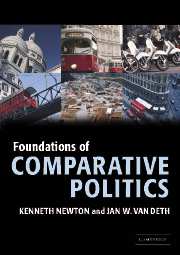Book contents
- Frontmatter
- Contents
- Acknowledgements
- List of briefings
- List of fact files
- List of controversies
- List of tables
- List of figures
- List of abbreviations and acronyms
- Key terms and concepts
- PART I The state: origins and development
- PART II The polity: structures and institutions
- 3 Constitutions
- 4 Presidential and parliamentary government
- 5 Multi-level government: international, national and sub-national
- 6 Policy making and legislating: executives and legislatures
- 7 Implementation: the public bureaucracy
- PART III Citizens, elites and interest mediation
- PART IV Policies and performance
- Glossary of key terms
- Index of names
- Index of subjects
3 - Constitutions
- Frontmatter
- Contents
- Acknowledgements
- List of briefings
- List of fact files
- List of controversies
- List of tables
- List of figures
- List of abbreviations and acronyms
- Key terms and concepts
- PART I The state: origins and development
- PART II The polity: structures and institutions
- 3 Constitutions
- 4 Presidential and parliamentary government
- 5 Multi-level government: international, national and sub-national
- 6 Policy making and legislating: executives and legislatures
- 7 Implementation: the public bureaucracy
- PART III Citizens, elites and interest mediation
- PART IV Policies and performance
- Glossary of key terms
- Index of names
- Index of subjects
Summary
Although the citizens of a given state may feel that theirs is the only or the best way of doing things, there is nothing natural or God-given about having a president rather than a prime minister, a unitary rather than a federal system, or two legislative assemblies rather than one. In fact, it is probably true to say that every modern democracy (chapter 2) has a unique set of government institutions, and combines them in unique ways. It is certainly true that there is no agreed formula or set of rules that will produce a democracy; each country follows its own special path and makes its own special arrangements.
The particular configuration of institutions in any given state (chapter 1) is defined by its constitution. This is the most basic set of laws that establishes the shape and form of the political structure. We start this chapter, therefore, by considering the nature and purpose of constitutions – what they are and why we have them. Constitutions try to create a complex set of checks and balances between the different branches of government, so that no one institution or person has too much power. We then introduce the three main branches of government – the executive, legislative and the judiciary – and outline their basic purpose and design. Constitutions, however, are only the beginning, not the end of the story of comparative politics, so we also discuss the limits of constitutionalism and why it is necessary to go beyond formal laws to understand how democracies work in practice.
- Type
- Chapter
- Information
- Foundations of Comparative Politics , pp. 41 - 59Publisher: Cambridge University PressPrint publication year: 2005



